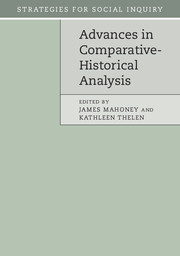Book contents
- Frontmatter
- Contents
- List of figures
- List of tables
- List of contributors
- Preface
- Part I Introduction
- Part II Agenda-setting work
- 2 The developmental state is dead: long live the developmental state!
- 3 Coalitions, policies, and distribution: Esping-Andersen's Three Worlds of Welfare Capitalism
- 4 Not just what, but when (and how): comparative-historical approaches to authoritarian durability
- Part III Tools for temporal analysis
- Part IV Issues of method
- Epilogue: comparative-historical analysis: past, present, future
- Index
- References
3 - Coalitions, policies, and distribution: Esping-Andersen's Three Worlds of Welfare Capitalism
from Part II - Agenda-setting work
Published online by Cambridge University Press: 05 July 2015
- Frontmatter
- Contents
- List of figures
- List of tables
- List of contributors
- Preface
- Part I Introduction
- Part II Agenda-setting work
- 2 The developmental state is dead: long live the developmental state!
- 3 Coalitions, policies, and distribution: Esping-Andersen's Three Worlds of Welfare Capitalism
- 4 Not just what, but when (and how): comparative-historical approaches to authoritarian durability
- Part III Tools for temporal analysis
- Part IV Issues of method
- Epilogue: comparative-historical analysis: past, present, future
- Index
- References
Summary
The publication of Gøsta Esping-Andersen's foundational work Three Worlds of Welfare Capitalism in 1990 marked a decisive moment in the study of cross-national social policy, creating a research legacy enduring over time, across disciplines, and across methodological approaches. What explains this profound influence? This chapter argues that Three Worlds was so deeply successful in generating a productive research agenda precisely because of the way that Esping-Andersen grounds his understanding of the welfare state in comparative-historical analysis.
The core argument in Three Worlds is that advanced capitalist democracies vary not only in how much they spend on social welfare but also in how they spend on it. Understanding welfare capitalism requires examining how packages of institutions, both in the state and the market, interact to produce particular types of distributive outcomes. It is crucial to emphasize that this insight, which is now widely internalized in the contemporary political economy debate, was extremely novel at the time, challenging previous work presenting welfare development in more or less linear terms. Both the core typology of Three Worlds and Esping-Andersen's broader analytic shift in emphasis toward understanding welfare institutions as the product of particular historical struggles opened the space for a vastly productive research agenda.
First, Esping-Andersen's aim is to understand one of the central large-scale shifts in twentieth-century politics: the rise and operation of welfare institutions. To do so, he argues that we cannot hive off a single institution (e.g., gross social spending, labor market policy) from other institutions. Nor can we understand the way institutions operate in an abstract or temporally independent way. Rather, Three Worlds argues that the structure of the labor market and the state work in tandem, in configurations, to shape broader power relationships and outcomes.
Second, Esping-Andersen, like many both before and after him, conceptualizes the politics of the welfare state as a product of the tension between the inequality produced by capitalism and the equality of parliamentary democracy. Yet, the resolution of this tension is neither uniform nor linear but a product of particular political struggles.
Information
- Type
- Chapter
- Information
- Advances in Comparative-Historical Analysis , pp. 67 - 96Publisher: Cambridge University PressPrint publication year: 2015
References
Accessibility standard: Unknown
Why this information is here
This section outlines the accessibility features of this content - including support for screen readers, full keyboard navigation and high-contrast display options. This may not be relevant for you.Accessibility Information
- 4
- Cited by
